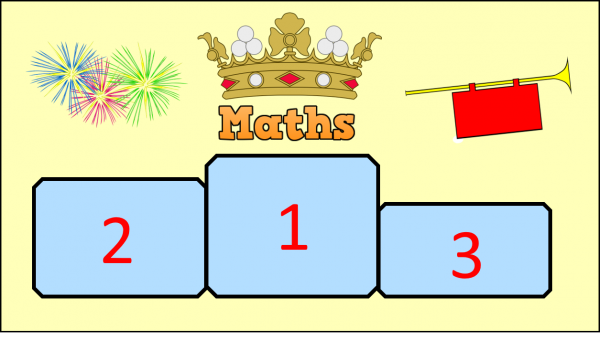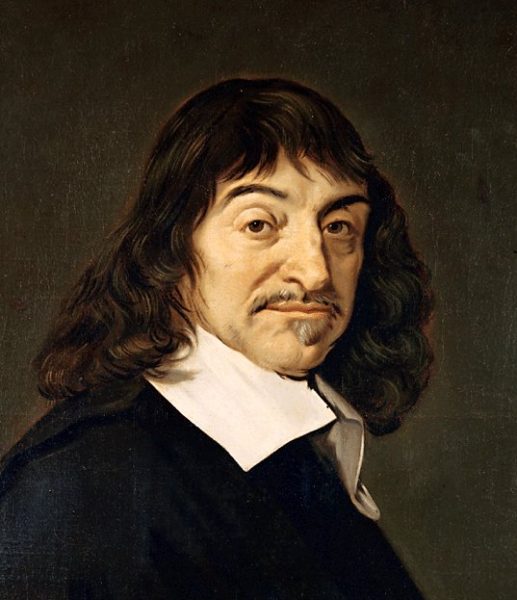
WHAT’S INTERESTING ABOUT THE NUMBER ONE?
ONE is the only number that’s the same in binary, base 10 and Roman Numerals.
It’s the wheels on a unicycle, the rails on a monorail and the players when you go solo.
One is the first odd number, the first triangular, square, pentagonal and hexagonal number, and the first tetrahedral, cube and Fibonacci number.
Read the rest of this page »
WHAT’S THE POINT OF LOGARITHMS?
On meeting this adorable litter of ten Dalmation Puppies the other day, I quickly spotted (ahem) the need for Dogarithms – the canine equivalent of logarithms. The conversation with dog breeder Maxine went something like this:

Read the rest of this page »
FATHER: “How did you do on your maths test?”
JANE: “I did better than average, but then so did most of the class”
Jane’s statement seem ridiculous – how can most people be better than average? Using some mathematical trickery, here’s how she could be logically correct.
Read the rest of this page »
$x$ is the ideal letter to represent the unknown simply because the other letters are so busy doing other things! To demonstrate, here is a small (not exhaustive) collection of mathematical measures, physical quantities and units, using all upper and lowercase letters a to Z (with just two blanks – can you fill them?). Some will be familiar to primary School students; most if not all will be familiar by the end of an A-level mathematics course. Why not see if you can create your own algebra alphabet of mathematical letters first, before reading mine? Good luck!
Read the rest of this page »
Don’t get me wrong: History, Spanish, Music and Drama are all great – even Latin (well, maybe Latin…). All learning is good: studying helps to keep your brain fit in the same way that exercise keeps your body fit, and a good range of both general and specialist knowledge enriches our lives hugely. But trigonometry and quadratic equations transcend Oxbow Lakes, Adverbial Clauses and Post-modernist art because only mathematics has these five extra qualities that make it the indisputable top of the pile!

Read the rest of this page »
This is the story of rotations, reflections and enlargements and translations. It’s about an ingenious shape that lives in millions of households yet that few people have even heard of. And it’s the story of how some simple maths – GCSE transformations and a little geometry – led to a revolution in photography. This is the story of the Roof Pentaprism: a simple yet beautiful solid shape at the heart of every DSLR camera (that’s the posh ones!).
Read the rest of this page »
HOW CAN I MAKE MATHS FUN?
House Of Maths was recently interviewed on the radio about the new GCSE and “real life” maths problems. But while making maths relevant IS important, “keeping it real” doesn’t automatically make maths fun – especially if your teacher is more like Miss Trunchbull than Miss Honey. Instead, here are the six ACTUAL secrets of turning maths from boring to brilliant:
Read the rest of this page »
Isn’t maths great? Everything is either right or wrong, it all makes sense and as long as you follow the rules everything will be ok. Right? Umm… no.
Here are my Ten Commandments of Maths: all were considered to be obviously correct at one time but, as we shall see, rules are made to be broken.
Read the rest of this page »
John Venn did not invent the Venn Diagram (the original idea was Euler’s). But he is famous for popularising the diagram which now takes his name. Mathematicians are always looking for ways to make abstract ideas easier to picture – like the Number Line for “picturing” numbers, or the Bar Chart for picturing data. Venn Diagrams are a beautiful way to organise groups, or “sets” of objects.
A FUN EXAMPLE: suppose we want to sort these items into “things with exactly four legs” (Set A), and “the rest” (not in Set A):
John Venn, zebra, cat, octopus, tripod, chair.
One way to do this would be to split them into two lists, but a far prettier way is to arrange them into a Venn Diagram with one circle:
Read the rest of this page »

This handsome chap is Frenchman Rene Descartes (1596-1650), who famously said “I think therefore I am”.
If you’re thinking about what he might mean by this, then it apparently means you exist – great news and congratulations!!
But the reason Descartes is my “hero of maths” for this month is because he also gives his name to CARTESIAN GEOMETRY – which is what you do when you plot the point (4,3) on a graph by going “along the corridor and up the stairs”. By the way, “Geometry” is a posh word for “Shapes”.
Read the rest of this page »



